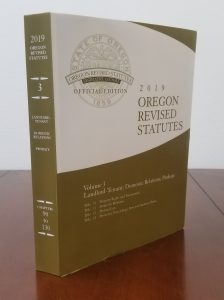On May 18, 2023 the Court of Appeals affirmed the trial court’s eviction judgment for the landlord in a case involving the requirements of a for cause termination notice. Oregon law requires that a landlord provide a tenant with a right to cure (fix the problem) if the for-cause reason for terminating a tenancy “can be cured by the tenant by a change in conduct, repairs, payment of money or otherwise[.]” ORS 90.392(4)(a). This case decided that the landlord makes the call if a tenant can cure a reason for termination. In this extreme case, the Court found that the repairs, costing somewhere between $20,000 and $100,000 could not have been completed by the tenant within the 14 days. Time will tell whether this opinion is appealed. The Court of Appeals read a requirement for the landlord to assess whether the cure can happen within the 14 day minimum time period, but the statute contains no such limitation. Unless and until contrary precedential opinion, the opinion will stand: landlord are able to decide, in good faith, whether or not a tenant would be able to cure a for cause reason for termination within 14 days and, if not, may issue a for cause notice of termination without providing any notice or ability for a tenant to cure.
Oregon Supreme Court Clarifies Dissolution Property Division
The end of the year in 2019 saw a decision from the Oregon Supreme Court, Staveland and Fisher, 366 Or 49 (2019) which clarified the standard of review for domestic partnership matters – those involving the dissolution of unmarried non-registered domestic partners. The Court of Appeals, in affirming a portion of the trial court judgment, used a standard of review from an earlier case that centered on the property distribution in a dissolution of marriage case. The Oregon Supreme Court corrected the Court of Appeals on the proper analysis – determination of the intent of the parties and upholding findings of fact from the trial court if there unless no evidence supports the finding. The Supreme Court left open the door for a future argument that in addition to the effectuation of the intent of the parties, equity should be taken into account when deciding on a distribution of property – an argument that was not presented.
The Supreme Court also clarified and presented the proper analysis for distribution of property in a dissolution of marriage case as well. The opinion in Staveland and Fisher will be helpful to judges, attorneys and litigants in understanding the proper analytical framework to distribute property in cases of dissolution of marriage and dissolution of domestic partnerships.
Court of Appeals Confirms Violations’ Role in Restraining Order Continuations
P.K.W. v. Steagall, 299 Or App 820 (2019) involved a pushback on a line of caselaw under the Family Abuse Prevention Act that had established a distinction between actions taken while an abuser and a victim lived together and the potential for further abuse once they no longer cohabitated. The Court of Appeals looked to the respondent’s pending contempt matters for alleged violations of the temporary restraining order to determine that he posed an imminent threat of further abuse. The Oregon courts have looked to evidence of repeated behavior and post-separation behavior to determine whether a respondent poses an imminent threat of further abuse against a restraining order petitioner. This case further stands for the prospect that all recipients of a FAPA restraining order must comply with the temporary order to avoid contempt charges and to avoid providing further evidence of the need for a restraining order.
Oregon Allows Sealing of Eviction Records
A new Oregon law, effective January 1, 2020, allows a tenant in Oregon to request that an eviction case be set aside and the record sealed.
Why Seal a Record?
The sealing of the record and setting aside of a judgment means that tenants would not be required to disclose a prior eviction matter to future prospective landlords. Future prospective landlords would also not be able to search for and find those records.
When Can the Record Be Sealed?
If a judgment of restitution is entered against the person applying for the judgment to be set aside and record sealed, the applicant must have satisfied any money award in the judgment and five years must have passed.
If the case was dismissed without a judgment of restitution and the tenant complied with any agreements made in that case with the landlord, there is no waiting period.
What is the Filing Fee?
There is no filing fee for a motion to set aside an eviction judgment and seal the record.
How Can You Get Started?
Our attorneys at The Bridge Law Firm stand ready to help tenants clean their civil records of prior old or dismissed eviction cases. Contact us to begin the process.
Lack of Address in Move Notice Invalidates Eviction
Crown Property Management, Inc. v. Cottingham, 299 Or App 553 (2019), is a case that reaffirms the very technical nature of some of the requirements of being a landlord in Oregon. In this case, the landlord had the proper language in the rental agreement to allow the service of notices (such as an termination of tenancy notice) to be done by “nail and mail” – a process of posting the notice to the door of the rental unit and mailing a copy to the residential rental address. These requirements include stating in the rental agreement a place for the tenant to use “nail and mail” to serve notices to the landlord. The landlord moved offices and provided a notice to all the tenants telling them that they could find the office at a certain building. Even though the tenant agreed that he knew where the new office was, the fact that the notice failed to contain an updated mailing address for the landlord, the Court found that the tenant was unable to take advantage of “nail and mail” service. Because the tenant was not afforded “nail and mail,” the landlord could not use it either. The benefit of “nail and mail” is that it allows notices to be delivered in a manner that avoid an otherwise addition of three days to any notice period on mail service (72 hour notices become 72 hour plus 3 days). Because then the landlord’s notice did not provide the tenant with as much time as is required by law, the notice was defective. This meant that the eviction was not based on a valid notice. Therefore, the tenant could not be evicted and the landlord was subject to an attorney fee request by the prevailing tenant.
Senate Bill 608 – Some Lasting Effects of Rent Control
What is Senate Bill 608?
The new Oregon rent control law will likely have a multitude of effects. The main likely effects will be to protect vulnerable tenants, reduce the profitability for certain rental units, and increase litigation surrounding evictions. The legislature, in finding that quick increases in the rental market were causing additional issues in the housing market, decided to put a cap on increases in rent within a 12 month period. The allowed increase is 7% over an inflation number generated for products on the West Coast in the fall on a yearly basis.
What does Senate Bill 608 Mean for Portland Tenants?
In order to keep landlords from being able to simply evict a tenant and raise the rent on a new tenant, the legislature ended the ability for landlords to terminate tenancies for no reason or cause.
What does Senate Bill 608 Mean for Portland Landlords?
While this protects tenants and the value of their leaseholds, it also means that landlords who have problem tenants – tenants who cannot get along with other tenants, cause continuing minor disturbances, etc. – cannot just no-cause evict them. Landlords will have to either make a deal with such tenants to leave or be prepared to show that there has been a material violation of the rental agreement or other tenant duties. Also, certain properties will have bigger issues with getting brought into compliance with habitability standards.
For any landlord who has a derelict property and has been getting by on accepting low rents, there is a real risk of being on the hook to make repairs that cost more than any rental income while also being unable to end the tenancies for the derelict building.
How Can The Bridge Law Firm Help with Senate Bill 608 Issues?
If you are a Portland, Oregon Landlord or Tenant affected by Senate Bill 608, The Bridge Law Firm can help you assess your situation and advise you on your best options.
If you are a Portland, Oregon Landlord or Tenant affected by Senate Bill 608
Contact us to help you assess your options.

